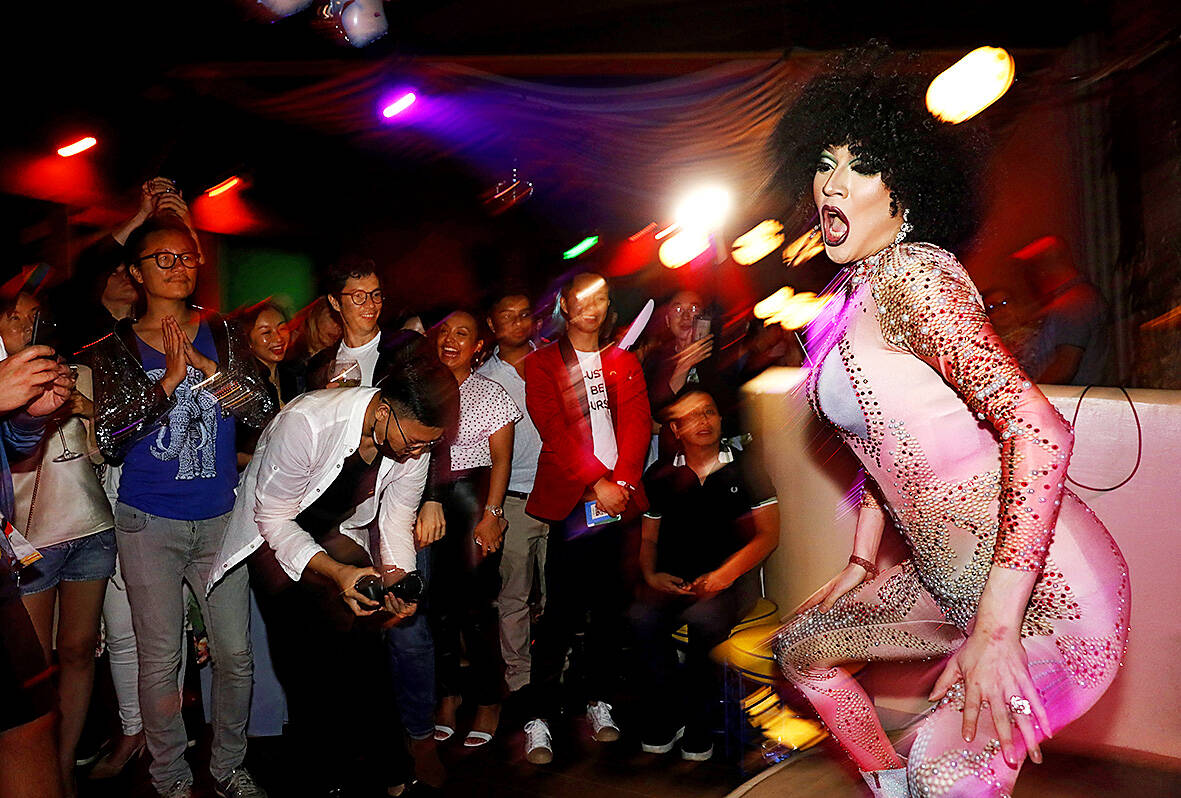On Nov. 24, exactly two years after a fire in an apartment building in Xinjiang killed 10 people and sparked a wave of historic protests across China, two dozen people gathered in a small bookshop in the Netherlands to reflect on the event.
“When anger becomes infectious, / when words are seen to be dangerous, / leave me blank, please!” Hongwei Bao, an associate professor at the University of Nottingham, read to the small, predominantly Asian audience.
Bao’s poem, White Paper, was inspired by the protests that erupted in China in late 2022, as anger spread about the harsh “zero COVID” measures that were seen as leading to the fire’s death toll and the suffering that people in China had endured on and off for three years during the pandemic. It was the biggest mass uprising against the government in decades.

Photo: Reuters
Bao was in the Netherlands to launch his new poetry collection, The Passion of the Rabbit God. The book’s title poem is a contemporary retelling of story of Tuer Shen, a mythical Chinese rabbit god who has become a symbol for the LGBT community.
“I can’t imagine that my book would be sold in China,” says Bao, who focuses on Chinese queer cultural studies. “Partly because it is written in English, partly because it touches on political and social issues such as queer rights and feminism … It is no longer possible to sell those books or publish those books in China.”
That Bao was able to present his work to a largely Chinese audience is thanks to Nowhere Netherlands, the latest branch of the Nowhere chain of Chinese-language bookstores that has set up shop in Chiang Mai and Taipei. Other independent bookshops have also been forced to close in China and Hong Kong, and are reappearing everywhere from Japan to the east coast of the US.

Photo: AP
Since China’s borders reopened at the start of last year, there has been a flood of people leaving the country, especially from the middle classes who had previously enjoyed a comfortable life in the country. While people have never had free rein to talk about certain topics, such as human rights and politics, for years the rising standard of living and limited space afforded to independent venues to hold small gatherings made living in a Communist party-controlled country worthwhile, or at least tolerable.
But now, for many, the calculation has changed.
China’s economic growth is slowing, with this year’s GDP expansion rate expected to barely reach the government’s target of 5 percent. And China’s president, Xi Jinping (習近平), has placed a renewed focus on national security at the expense of all manner of free expression. That has increased the pressure on independent outfits such as bookstores, cinemas and discussion groups.

Photo: EPA-EFE
Hosting even private gatherings of people who are known by the authorities to be interested in discussing topics such as feminism and human rights has become difficult. As well as selling thought-provoking titles, independent bookshops used to be places that held uncensored film screenings and talks by academics. But such activities are becoming harder to organize.
One victim of China’s crackdown on civil society was Jifeng Bookstore, a popular independent bookstore in Shanghai that was forced to close in January 2018 after the landlord refused to renew its lease. Yu Miao, Jifeng’s manager, thought it was the end of a two-decade run of serving curious and intellectual-minded customers in China’s most cosmopolitan city.
“At that time, my thought was that the bookstore was shut down, and I had done my best. I didn’t have any regrets,” says Yu, the bespectacled former businessman who bought Jifeng from its original owner in 2012.
Yu had long been familiar with the cat-and-mouse game of evading the authorities. But in 2017, as he explored trying to find an alternative venue for Jifeng, he realized that the shop was bugged. The local police told Yu they had recordings of the bookshop’s activities, and they seemed to know the content of even small meetings.
So the Jifeng team would gather at a nearby bookstore and cafe, for privacy. Its name was 1984.
The 1984 bookshop provided space for “a more relaxed conversation, and there was a cat there, which we really liked,” Yu recalls.
Today, however, Yu feels a world away from China’s all-hearing big brother. In September, more than 7,000 miles away from its original location, Jifeng reopened as JF Books in the Dupont Circle neighborhood of Washington DC. Already, Yu has received customers from New York, North Carolina, and Pennsylvania, including people who used to visit the shop in Shanghai.
JF Books is Washington DC’s only Chinese-language bookstore. Yu is hoping to recreate some of the cosmopolitan atmosphere that made the Shanghai branch unique. About 30 percent of his stock is English books, and the rest are Chinese-language volumes on politics, social sciences and philosophy, including titles by African and South American writers.
“In China, we used to say we were an independent bookstore, because we were independent from the power of the government … it showed a sense of freedom,” says Yu, who relocated to the US with his family in 2019. “But in the US, I don’t think the term ‘independent bookstore’ is very important to us any more.
“Because here, you are already independent, right? You don’t have an authority that controls you. So I usually don’t call my shop an ‘independent bookstore.’ It’s just a bookstore.”

A vaccine to fight dementia? It turns out there may already be one — shots that prevent painful shingles also appear to protect aging brains. A new study found shingles vaccination cut older adults’ risk of developing dementia over the next seven years by 20 percent. The research, published Wednesday in the journal Nature, is part of growing understanding about how many factors influence brain health as we age — and what we can do about it. “It’s a very robust finding,” said lead researcher Pascal Geldsetzer of Stanford University. And “women seem to benefit more,” important as they’re at higher risk of

Eric Finkelstein is a world record junkie. The American’s Guinness World Records include the largest flag mosaic made from table tennis balls, the longest table tennis serve and eating at the most Michelin-starred restaurants in 24 hours in New York. Many would probably share the opinion of Finkelstein’s sister when talking about his records: “You’re a lunatic.” But that’s not stopping him from his next big feat, and this time he is teaming up with his wife, Taiwanese native Jackie Cheng (鄭佳祺): visit and purchase a

April 7 to April 13 After spending over two years with the Republic of China (ROC) Army, A-Mei (阿美) boarded a ship in April 1947 bound for Taiwan. But instead of walking on board with his comrades, his roughly 5-tonne body was lifted using a cargo net. He wasn’t the only elephant; A-Lan (阿蘭) and A-Pei (阿沛) were also on board. The trio had been through hell since they’d been captured by the Japanese Army in Myanmar to transport supplies during World War II. The pachyderms were seized by the ROC New 1st Army’s 30th Division in January 1945, serving

The People’s Republic of China (PRC) last week offered us a glimpse of the violence it plans against Taiwan, with two days of blockade drills conducted around the nation and live-fire exercises not far away in the East China Sea. The PRC said it had practiced hitting “simulated targets of key ports and energy facilities.” Taiwan confirmed on Thursday that PRC Coast Guard ships were directed by the its Eastern Theater Command, meaning that they are assumed to be military assets in a confrontation. Because of this, the number of assets available to the PRC navy is far, far bigger